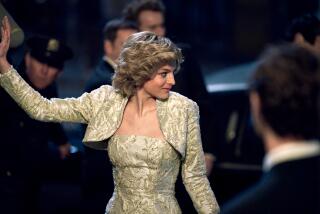Britons Now Bash the Iron Lady : Critics Imperil Thatcher’s Tenure
- Share via
LONDON — This past week was a lousy one in the political life of Margaret Thatcher--perhaps the worst. Her probity is under attack and in defense of her honor even the Iron Lady appears to wilt, as though she may be losing her grip.
She was typed as the Iron Lady in 1979 because of her uncompromising hostility to the Soviet Union. But she liked the label and did her best to live up to it, although the iron showed more clearly in her relations with Argentina. British trade unions felt her metal too.
As the first woman to lead a major Western nation, Thatcher became a legendary figure, and rightly so. President Reagan listened respectfully, even when he was not entirely sure of her thrust. (She is sometimes overexcited and speaks too quickly; perhaps he is occasionally a trifle slow.) After nearly seven years in office, there has been a tendency to take Thatcher for granted.
So it is now surprising when commentators, in her own party and in weighty weekly papers, assert that one problem is her not being tough enough.
This remarkable contention comes after weeks of interminable discussion about the rescue of a near-bankrupt British helicopter company called Westland: Should it be bailed out by the American company, Sikorsky, a subsidiary of United Technologies, or by a consortium of European manufacturers? The argument rumbled on over Christmas, providing newspapermen with innocent amusement at a time when there is normally little to write about; then it exploded in January when the defense minister, Michael Heseltine, resigned.
A lean, ambitious man with flowing blond hair (known familiarly as Tarzan), Heseltine--who had supported the European consortium--simply picked up his dispatch box and strode out of the Cabinet Room at 10 Downing Street. It was so sudden that the policeman at the front door was asked by the Cabinet secretariat to check with waiting reporters to be sure he really had resigned.
Heseltine was shown in a cartoon for the Times of London wearing a loin cloth, swinging out of Downing Street crying, “Me Tarzan; she shame.” He complained that Thatcher was biased in favor of Sikorsky. She cancelled meetings in which he would have made the European case because she was afraid of losing, Heseltine said.
But the case for Thatcher’s loss of authority begins with the charge that instead of stating her own clear preference for an American or a European solution, she just dithered. And by failing to bring this dismal dispute to an abrupt end, she allowed Heseltine to elevate a minor matter of industrial policy into an international confrontation.
Worse, the prime minister and her colleagues did not stick to the same story. Next they were caught leaking to a reporter secret documents embarrassing to Heseltine. They began to look like liars or incompetents. In the House of Commons on Thursday, they were accused of being both. The charge was directed particularly at Thatcher’s trade minister, Leon Brittan. He found it intolerable. The grim climax of the prime minister’s week came on Friday, when Brittan rejected her entreaties and resigned.
The government is mortified. There is an awful suspicion in the Conservative Party that none of this would have happened if the prime minister were a man. Some of her own “supporters” already deploy a nasty little phrase about her: “Government by hot flush.”
After the successive general-election victories in 1979 and 1983, it appeared that the prime minister’s sex was no longer an issue. The truth is that it only goes away when the prime minister is doing well. When the government is doing badly, her nature becomes part of the explanation. Heseltine has been providing fresh ammunition. “No one has finished a sentence in Cabinet for the past three years,” he snorted. There you are: She is a scold.
The charges are contradictory, of course. On one hand, the smart London commentators imply that inside that bold exterior there is an irresolute little woman trying to get out. On the other, Heseltine and his allies say the problem is that she is a prime minister trying to wield presidential power. Moreover, she is incapable of listening to advice.
Thatcher’s predicament is that, contrary to the rule that states you can’t have it both ways, her critics do, accusing her of being both too strong and too weak. This ought to concentrate the mind. Surely she deserves a more objective assessment of virtues and failings.
Her greatest international success was the Falklands, but this is a diminishing asset, and a costly one. Memories of brave exploits fade, but the bill still has to be paid. The cost of the garrison this year is $760 million.
Thatcher’s government has controlled inflation, but the deepest mark she will leave on Britain is having confronted and defeated the trade unions. Since the defeat of the miners under Arthur Scargill, strikes have tended to be rear guard actions by isolated groups of workers.
Consequently, radicals on the left refer to her contemptuously as That Woman (indicating that they recognize who is boss). Labor politicians blame the prime minister personally for the existence of 3 million unemployed people and there is no doubt that historians will immediately associate this barely tolerable level of unemployment with her administration.
As the Westland episode shows, criticism is not a monopoly of the left. Many of her supporters, in the party and in business, also complain that Thatcherism promised more than it has delivered. Public spending his risen inexorably (because of welfare benefits for the jobless) and taxes have not come down.
She is particularly vulnerable to criticism from her own colleagues. Her manner in the Cabinet has alienated other distinguished Conservative politicians beside Heseltine. They sit behind her in the House of Commons, sniping. Often the most effective opposition comes from the Conservative backbenchers rather than the Labor Party. (David Owen, leader of the Social Democrats, can scarcely conceal his own admiration for her.)
Thatcher is being attacked from most sides, and the sensible conclusion is that she can’t win. But that would be premature. Many, perhaps most, politicians do not like her. But her courage is still admired outside the political hothouse in Westminister. There is no evidence so far that she is about to concede defeat.
There was a time when being a woman helped. This is no longer the case. The contrary may well be true. Thatcher is now like any other veteran political leader battling for survival. To put up with this suggests that she really is made of iron.
More to Read
Sign up for Essential California
The most important California stories and recommendations in your inbox every morning.
You may occasionally receive promotional content from the Los Angeles Times.










